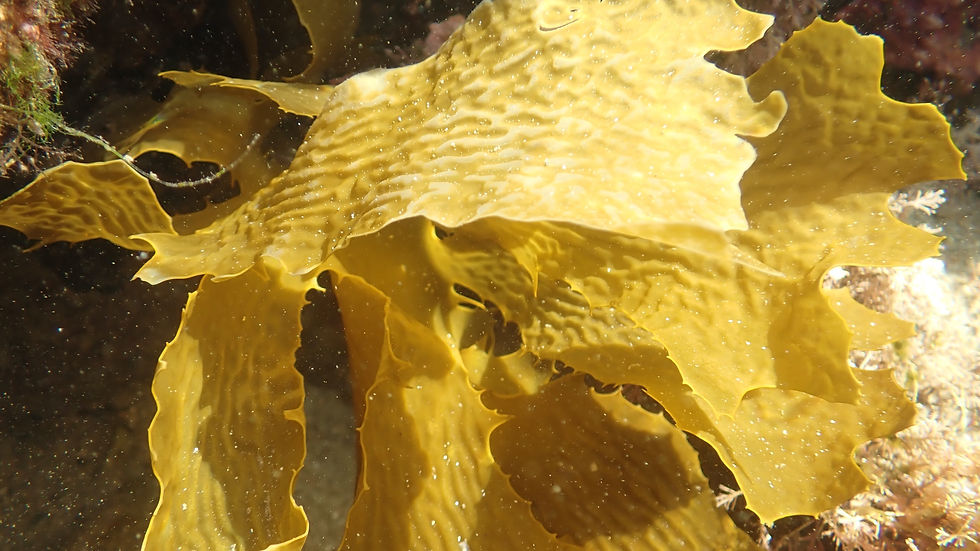Anti-aging potential of brown seaweeds unveiled
- Catherine Norwood
- Nov 16, 2023
- 3 min read
Updated: Nov 23, 2023

A rich anti-aging extract that can help maintain healthy skin has been developed from South Australia's brown seaweeds.
The extract, developed by a research team at Flinders University, significantly increases collagen levels in the skin and protects against the deterioration of both collagen and elastin, due to glycation reaction between proteins and carbohydrates.
“We found that extracts from selected South Australian brown seaweed have huge potential to help slow the effects of aging on our skin,” says Professor Wei Zhang from the university's College of Medicine and Public Health.
“Collagen acts as a building block for bones, teeth, muscles, skin, joints and connective tissue, while elastin gives skin its elasticity and strength. Both these proteins are popularly promoted by the beauty industry as essential for the appearance of healthy skin,” he says.
The Flinders team found that the extracts also inhibit a process called glycation, which leads to the deterioration of collagen and elastin.
Dr Zhang says the beauty industry worldwide has been chasing effective anti-glycation agents for some time, without much success.
“So far, anti-glycation agents haven’t been strong enough to have a major impact on anti-aging, so our discovery is really exciting. We can see the potential to develop stronger anti-glycation extracts from brown seaweed," he explains.
Species selection
Researchers evaluated many seaweed species and discovered the surprising anti-aging qualities of extracts from three selected South Australian seaweeds – Ecklonia radiata, Cystophora moniliformis, and Cystophora siliquosa. These were collected from freshly deposited beach-cast seaweeds in Rivoli Bay, Beachport, South Australia, and are found more widely along the southern Australia coastline.
These were shortlisted from an initial selection of more than 10 species from each of the the brown, red and green seaweed groups. Dr Zhang says one of the selection criteria included abundance in the wild.
This could allow for the wild-harvesting of seaweeds to support the initial commercialisation phase, until aquaculture processes are established. Of the three species tested, Ecklonia radiata is the most common, and is also most advanced towards commercial propagation in Australia and New Zealand.
A seaweed bioactive industry
Southern Australia has the world's highest diversity of recorded seaweeds, with up to 1500 described species. Of these, approximately 62% are endemic to the region.
Dr Zhang says it's possible that among so many, there may be other species that will yield similar bioactive extracts. He sees the future of the Australian seaweed sector as focused on these kinds of high-value extracts as marine bioproducts, rather than the production of lower-value bulk biomass for food and feed.
“Seaweed is a great source of multiple bioactive ingredients with potential diverse applications in human health, nutrition and functional foods, including natural health and skincare products. Our findings will help to fill knowledge gaps and sustainably develop brown seaweed advancement in topical and supplement skincare products," he adds.

A patent has been filed and the team is looking for investors and industry partners to collaborate in commericalising the extract in the next few years.
The team's research paper, 'Anti-skin glycation and collagen level stimulation of brown seaweed extracts and their compositional characteristics', has been published in Algal Research journal.
Around the world, seaweed cultivation is rapidly expanding for commercial production of food, pharmaceuticals, materials, agriculture supplements and ecosystem restoration.
In Australia, seaweed production is forecast to become a $1.5 billion industry with 9000 jobs by 2040 – while contributing up to 10% of Australia’s emission reduction goals. South Australia is positioning itself as a national leader in the development of a world-class seaweed industry.
This is built upon the state's rich seaweed biodiversity and marine bioproducts innovation capacity at Flinders University, South Australia Research and Development Institute (SARDI), and Marine Bioproducts Cooperative Research Centre.
Research collaboration
The research team at Flinders University included Dr Suvimol Charoensiddhi, Dr Pawadee Methacanon, Mr Peng Su and Professor Zhang. Funding for the project was provided by Charitable Klein Research Institute Ltd and Flinders University.
The biochemical characterisation of this work was financially supported by the Office of the Ministry of Higher Education, Science, Research and Innovation, Thailand, and the Thailand Science Research and Innovation through the Kasetsart University Reinventing University Program 2021.
Dr. Kirsten Heimann at Flinders University has provided technical advice and support on cell culture and assay optimisation.

Comments